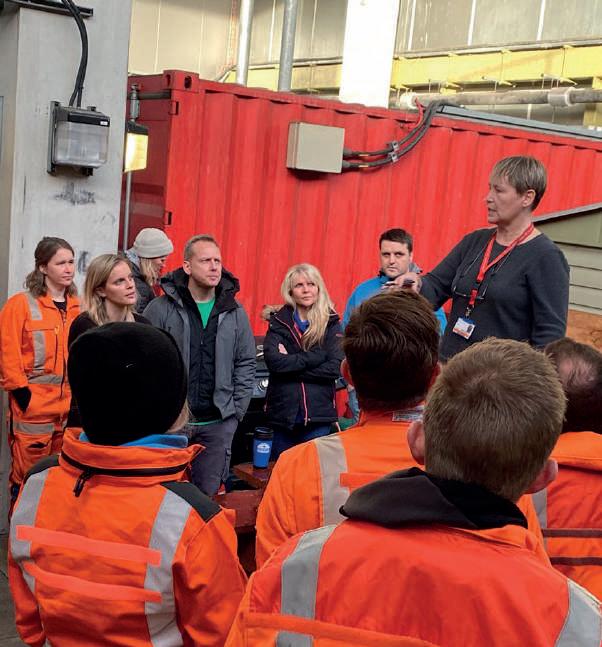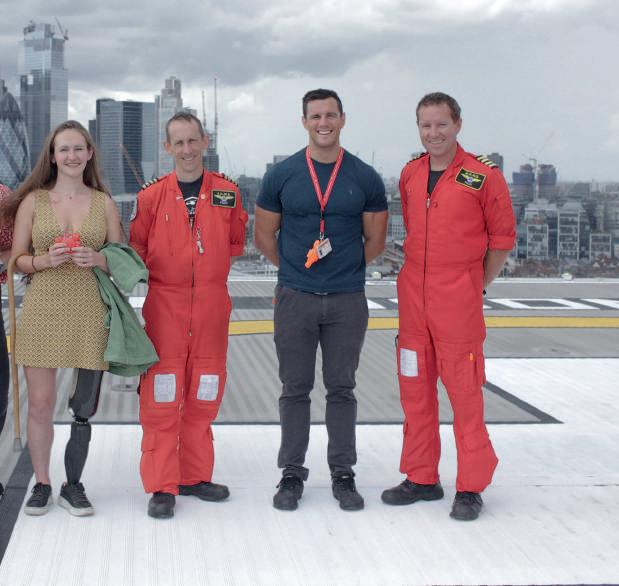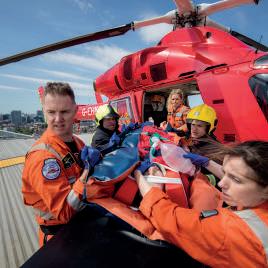
3 minute read
The Institute of Pre-Hospital Care
STRATEGIC OBJECTIVE 2 - OUTSTANDING CARE THE INSTITUTE OF PRE-HOSPITAL CARE
The 2019/20 financial year saw another hugely successful year for The Institute of Pre-Hospital Care in all areas of education, innovation and research.
Advertisement
We launched the world’s first Masters in Pre-hospital Medicine in partnership with Queen Mary University of London and delivered with Barts Health NHS Trust and The London School of Medicine and Dentistry. In September 2019 we welcomed the first cohort of students to the programme, that brings together key areas of theory and practice necessary for advanced practitioners in the pre-hospital field. During this financial period the cohort completed modules in Applied Toxicology and Applied Resuscitation. The Intercalated BSc in Pre-Hospital medicine continued to go from strength to strength, seeing 21 students join us as the sixth cohort in September 2019 and they achieved successful results throughout the year.
Our collection of short courses continues to grow and expand. The Pre-Hospital Care Course (PHCC), in its fourteenth year, saw a review and redesign in January 2020. This was to build and expand on the success and positive feedback of the course and to help try to better reflect the patients our clinical teams see and treat on a day-to-day basis. The course continues to attract candidates from across the world, helping to develop increasingly productive relationships with countries such as Northern Ireland, Canada and New Zealand.
We continued to run and develop the Pre-hospital Extracorporeal Life Support (PEELS) Course to train our pre-hospital teams undertaking our ECMO trial, the Sub 30 Trial.
Our Pre-Hospital Emergency Endovascular Resuscitation (PEER) course is focussed on REBOA and evolves each time it is taught, in response to lessons learned by our endovascular team during their educational visits across the world. Our service is now recognised as leading the way in the pre-hospital evolution of this type of intervention. The course allows us to innovate further with REBOA and has now expanded further to include the teaching and training for our teams to perform Zone 1 REBOA and partial REBOA, as part of the upcoming P-PRO (Pre-Hospital Zone 1 Partial Resuscitative Endovascular Balloon Occlusion of the Aorta) trial.
Our PUNCC (Pre-Hospital Underground and Novel Concepts Course) combines specific training for our teams who help those injured on the underground network with rehearsal and preparation for the delivery of all of the novel concepts and ideas that we have in
the service pertaining to these incidents. Throughout the 2019/20 financial period we delivered 3 PUNCC courses for our teams and invited our colleagues from Transport for London and the British Transport Police to allow for interdisciplinary training when attending incidents on the rail networks.
The Pre-Hospital Care Programme (PCP) academic fora, held once a month, continue to attract approximately 300 students each time, with Pre-Hospital care achieving an increasingly high profile within the medical school at Queen Mary University of London.
Our clinical fellows continue to push the boundaries in terms of understanding our patient groups and how we can create the survivors of the future. We currently have two clinical fellows in post; one looking into Head Injuries and the other looking into Causes of Death in Trauma and our Golden Hour Project.
The Golden Hour Conference II – The Pathology of Traumatic Injury expanded upon the findings presented at the 2018 conference and the further work carried out by Dr Michael Kim, our Golden Hour Fellow. We were fortunate to have expert speakers join us from around the world, to explore a huge range of material centred on the real problems that clinicians face at the roadside and in hospital when dealing with critically injured patients.
We undertook a detailed exploration of some of the most novel concepts in trauma care, benefitting from the insight of eminent guest speakers from a variety of backgrounds. In doing so we hope to have set the scene for the future, with new collaborations and friendships that help us all to innovate. This year’s clinical focus was around the two biggest killers from trauma, head injury and haemorrhage. The vital role that Coroners and Pathologists play in leading us to novel therapies was a centrepiece. Major incidents and terrorist attacks continue to pose significant challenges for medical teams across the world. The Golden Hour for each patient during mass casualty events is as vital to the individual as when a single patient presents alone. Our major incident sessions were delivered from the perspective of what every patient needs and deserves during these tragedies and real lessons learned from global events.










